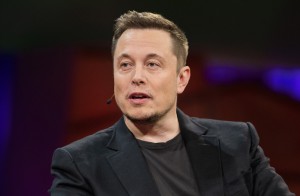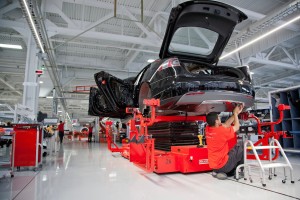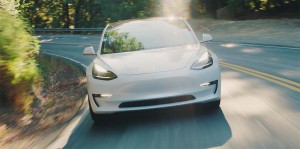
Tesla CEO Elon Musk is pushing supplies to provide refunds on parts, some of them from months ago, as he scrambles to bring the company into the black.
(This story has been updated with new information.)
Tesla has demanded that suppliers give it refunds on parts purchases, some of those dating well into the past, in order to help the carmaker deliver the promise CEO Elon Musk has promised for the second half of 2018.
It is unclear if Tesla would be able to make that target without the givebacks. Investors reacted with skepticism after the news broke over the weekend, the company’s stock tumbling sharply ahead of the bell marking the official opening of Monday morning trading.
Tesla officials told TheDetroitBureau.com in a email that only certain suppliers were asked for a refund on past products and that this kind of interaction is not out of the ordinary.
“Negotiation is a standard part of the procurement process, and now that we’re in a stronger position with Model 3 production ramping, it is a good time to improve our competitive advantage in this area,” the company said in the email.
“We’re focused on reaching a more sustainable long term cost basis, not just finding one-time reductions for this quarter, and that’s good for Tesla, our shareholders, and our suppliers who will also benefit from our increasing production volume and future growth opportunities.”
It’s the latest in a series of concerns surrounding Tesla that have sent the company’s shares on a roller-coaster ride. A whistleblower – whom the carmaker accuses of sabotage – has claimed Tesla falsely reported production numbers and concealed safety problems.
A major investment bank raised questions about whether large numbers of potential buyers holding early reservations for the Model 3 are canceling out. And TheDetroitBureau.com last Friday reported that new orders are not keeping up with the increasing pace of production at Tesla’s Fremont, California assembly plant.
(Musk denies scores of Model 3 order cancellations, but raises new work. Click Here for the story.)
The Model 3 is the foundation upon which Tesla’s future has been anchored. While substantially less expensive than the earlier Models S and X, the carmaker originally anticipated the Model 3 would account for about 80% of the volume from the Fremont plant total production targeted at 500,000 this year.

Tesla is quickly approaching the 200,000 vehicle limit that ends the $7,500 federal government tax incentive for EV buyers.
In fact, it will fall well short, due to what Musk has described as “production hell.” With output hitting just 2,000 a week by the end of March, Tesla reported its biggest loss ever for the first quarter. It is expected to be in the red, again, when it reveals its second-quarter numbers early next month. But Musk has repeatedly promised that Tesla will not only deliver a profit for the second half of this year but that it will be cashflow positive.
How it will achieve that is in question, however, based on a memo revealed by the Wall Street Journal over the weekend. Written by a global supply chain manager, it asked Tesla suppliers to provide refunds on past purchases, as well as on future purchases.
Tesla “confirmed it is seeking price reductions from suppliers for projects, some of which date back to 2016, and some of which haven’t been completed,” said the WSJ report which also quoted Dennis Virag, a veteran Detroit-based manufacturing consultant, calling the move “simply ludicrous.”
Tesla offered TheDetroitBureau.com more specifics on the actual process.
“We asked fewer than 10 suppliers for a reduction in total capex project spend for long-term projects that began in 2016 but are still not complete, and any changes with these suppliers would improve our future cash flows, but not impact our ability to achieve profitability in Q3,” the company noted.
“The remainder of our discussions with suppliers are entirely focused on future parts price and design or process changes that will help us lower fundamental costs rather than prior period adjustments of capex projects. This is the right thing to do.”
Following the publication of the memo, Tesla CEO Musk appeared to try to quiet concerns by saying that the company wouldn’t cook the books, using refunds on past spending to make the second-quarter look better.
(Click Here to see why Wall Street is concerned about Tesla.)
“Only costs that actually apply to Q3 & beyond will be counted. It would not be correct to apply historical cost savings to current quarter,” he tweeted.
Musk has had to go into damage control mode frequently in recent weeks. Just last week, he issued an unusual apology for calling one of the divers who helped rescue a young soccer team trapped in a flooded Thai cave a “pedo,” or pedophile. Later in the week, the South African-born CEO issued a blunt tweet declaring “bs” to a report by investment bank Needham and Company estimating 24% of the advance reservations for the Tesla Model 3 have been canceled. An earlier report by data site SecondMeasure put the cancelation rate around 20%.
A Tesla spokesman subsequently told TheDetroitBureau.com that there are still about 426,000 reservations for the Model 3. But that still does no answer a key question: how many of those will ultimately translate into firm orders for the compact battery sedan?
Tesla announced it reached a milestone when, during the last week of June it rolled out 5,000 Model 3s from Fremont. The spokesman told TheDetroitBureau that the target for the end of this month is 6,000. But that raised new concerns as Musk, in his tweet denying the high cancelation rate, indicated that Tesla had received only 5,000 new Model 3 orders last week.
In other words, if the pace of demand doesn’t accelerate, Fremont could soon be producing more of the sedans than the company needs to fill orders once the original backlog of advance reservations is fulfilled.
Tesla expects to see demand increase once it launches new Model 3 variants, including a twin-motor, all-wheel-drive version, and as it rolls test vehicles into its showrooms. Until now, potential customers have generally not been able to experience the Model 3 before deciding whether to place an order.
(To see more about Elon Musk’s erratic behavior, Click Here.)
Tesla faces other challenges, including an investigation by the Securities and Exchange Commission which is looking into claims by a whistleblower alleging the company has both inflated production numbers and allowed defective batteries to be used in vehicles shipped to consumers. Tesla, in turn, has accused that former employee of lying and, in a new federal lawsuit, of committing sabotage to its manufacturing system.


“…Tesla will not only deliver a profit for the second half of this year but that it will be cashflow positive.” Is it possible to deliver a profit without being cashflow positive?
“…changes with…suppliers would improve…cash flows, but not impact…profitability…” If cash flow improves, doesn’t that impact profitability?
“…Fremont could soon be producing more…sedans than the company needs to fill orders…” Hopefully Tesla won’t become another Kaiser-Frazer.
Allen, yes, it’s possible to be profitable but not cashflow positive, but I will leave it to the accountants to explain. The claim specifically was made by Musk. Same with second point. Yes, you could produce more cars than you have orders for. Happens all the time. And interesting comparison to another start-up that underestimated the challenges of the auto industry.
Paul E.
He needs to understand just because you can make 500K it doesn’t mean there are 500K people ready and able to purchase. Capacity / Capability to Demand is one of the keys. Not as simple as simply stated but not as complex as you’d think either…